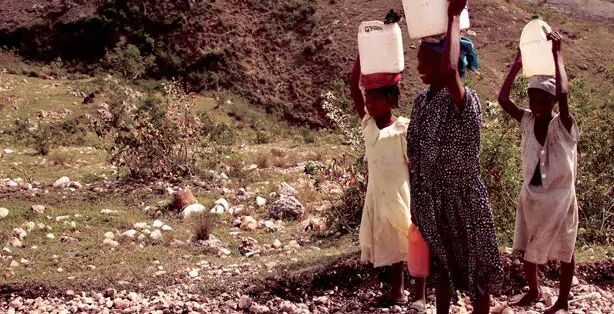
Life continues for Haiti’s people, albeit it’s a little different than before the earthquake. Seven months later, there are some underlying issues there beyond the basic needs of food, water and shelter. We spoke to Imogen Wall, a humanitarian affairs spokesperson for the UN, about meeting those basic needs as well as fighting gender-based violence, working out land rights issues and avoiding the creation of a culture of dependence.
What are the biggest challenges going into restoring Haiti?
When you come in and do sanitation and emergency response, it’s very difficult to say you’re propping up an existing system, because there was very little in the way of adequate sanitation before. Normally you would be looking at filling gaps, where systemically there were so many problems before.
Port-au-Prince is such a congested city that the task now of clearing everything up is massive. In those tiny little lanes and back streets, you can’t get the heavy equipment you would need to pull down buildings, to clear up or to do it on a massive scale. You’re looking at a lot of shovels and a lot of stuff being done by hand, and that’s just hugely labor intensive. Plus, every time you start clearing rubble, you find a body, and then the whole process has to stop while someone comes in and moves the body. It’s dangerous moving rubble, there’s a lot of metal and things in it, so you have to be properly equipped to do it, vaccinate everybody and get them hardhats.
Can you speak about the issues of gender-based and sexual violence?
Gender-based sexual violence was a very serious problem here before the earthquake, and a very vulnerable situation which people based in camps has not made better. It’s very difficult for women to find safe places to bathe, to wash unobserved. You see a lot of the showers have gone up in the camps, and electricity was limited here before, so lighting at night has been a real case. We’ve been trying to get lighting into the camps and patrolling, but there are an overwhelming amount of camps. We’ve got over 1,300 so, it’s not physically possible at the moment to have UN or Haitian police patrols at every single one of them every single night. It’s very difficult. We do our best though. People are out patrolling every night, and if you go out around the camps, you will see them. It’s an ongoing major concern, and one of the reasons why it’s vital that we get people out of these camps as soon as we can.
It seems like there isn’t a lot of land or places they can rebuild yet.
The land rights situation is extremely complex. Permanent structures takes time, and if you don’t take the time to do it properly, you get it wrong. And we’ve seen that elsewhere. … You have to get clarity on land rights and land ownership, otherwise you’re constructing conflict. You have to get the materials in. I mean, the quantity of materials needed to build the number of houses we need is enormous. You need the trained labor force. Particularly, you need the construction code, because we need to be building seismically proof houses. It’s ongoing. The building code is being worked on by the government and UNDP. The cash-for-work projects will transition, some of them into training for people to become construction workers. Plans are under way to bring in materials, but we’ve got to get transitional shelters and a lot of these materials. So the planning is going on, and you’ve got to have the community involved. People are going to be living in these things for the rest of their lives, permanent housing, long after we’ve all gone home. So we have to get right, and it does take time to do it properly.
What steps are taken to ensure that money is spent with transparency?
For the stuff that we administer, there is something called the financial tracking service online, which explains how the money has been allocated and why and what’s gone where. It tracks as we spend. We pass allow money, we administer grants to other organizations, and every organization has a responsibility to track its own funding and to be able to explain exactly where the money went. And this is something that a lot has gone into over the years, as accountability has become very important, particularly in a disaster like this where you have a very large portion of money that has come from people’s pockets. I think everyone here is acutely aware of the need to make that money work as hard as it can and to be able to demonstrate how it was spent. The other thing you have to bear in mind is you have to pace it, because you always get a huge amount of money at the start of a disaster, but if you’re not systematic, and you don’t plan for the longer term at the same time, none of that work is wasted. You can cure somebody of an illness in the first two weeks, but if there’s no aftercare for them, they just get sick again. That metaphor, you have to keep it going. So the donations have to be spent over a period of years in order to generate an outcome that really is going to work for this country.
What does a renewal of Haiti look like beyond just restoration?
From a humanitarian point of view, a renewed Haiti is a Haiti where nobody goes hungry. People have access to internationally accepted standards of water and health care and are free to live their lives from the kind of sexual violence we were talking about before. Haiti had profound humanitarian problems before this disaster, and that’s the whole country. I think one of the things we really have to make clear is this response has to be about this whole country, not just the affected areas, because the needs are so acute. It’s a developmental question really, but it’s a Port-au-Prince that’s an acceptable place to live, that has the sanitation systems and the electricity systems and the basic services that we all take for granted in the West, which many of which were not here before. This is not, in the long- term, this isn’t a reconstruction effort; this is construction. This is building, this is trying to bring in systems that actually will reduce some of the awful developmental disease that was here before. It would not be acceptable to aim to put Haiti back the way it was. No one thinks that Haiti the way it was was an acceptable way for people to be living. So we have to raise that. That has to be and has been an objective response from the very start.
How do you avoid a culture of dependence?
That’s a good question with a simple answer. Our job is to help Haiti help themselves. The people who will ultimately rebuild Haiti are not on our base, they’re out there, because it’s their lives and they know what they want from them. Our job is to help them get there and help them recover. … People are incredible here, they will rebuild their lives, and our job is to help them do that, and to help take on the bigger things that individuals can’t take on and need to be taken on by a state and by a system, and to support the state in doing that.






















